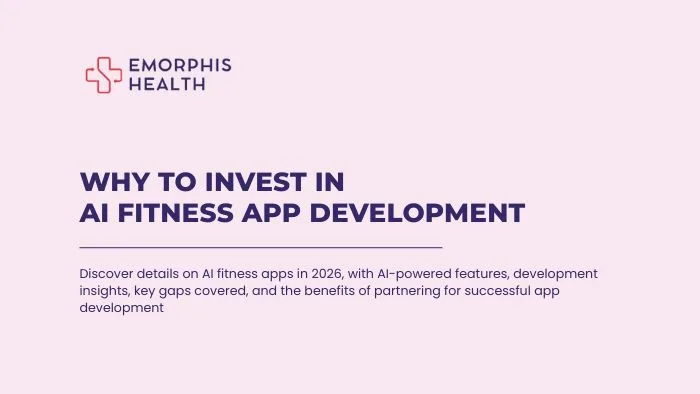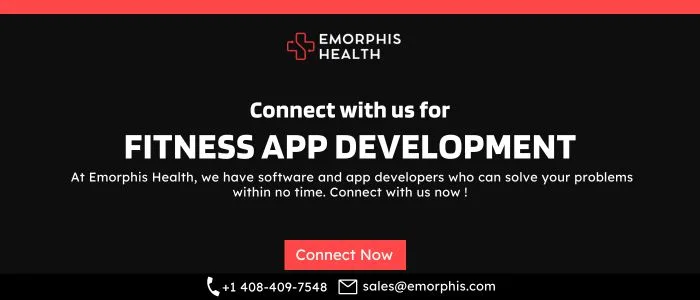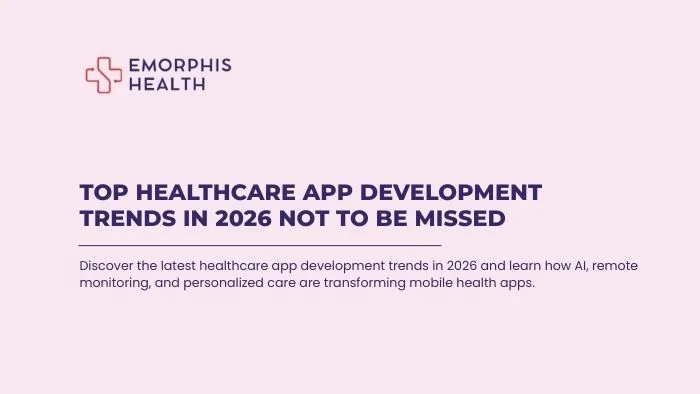The fitness industry has undergone a seismic shift in the last few years. With more people choosing to work out at home, demand for smart digital fitness solutions has soared. Traditional fitness apps are no longer enough. Today’s users expect real-time guidance, personalized routines, and intelligent feedback, all of which are made possible through artificial intelligence. If you’re a health tech entrepreneur or brand, AI-powered fitness app development is no longer a futuristic idea; it’s an urgent business opportunity.
Let’s now explore why it is a pivotal moment to enter the AI fitness space, what users expect from AI fitness apps, how to build one, and the cost involved in creating a high-performing product.
Why the AI Fitness App Market Is Booming
See Contents
- 1 Why the AI Fitness App Market Is Booming
- 2 What Users Expect From an AI Fitness App in 2026
- 3 Key Technologies Behind AI-Powered Fitness App Development
- 4 Development Process for an AI Fitness App
- 5 Estimated Cost to Develop an AI Fitness App
- 6 Key Gaps in the Market: How Your Business Can Benefit from AI Fitness App Development
Global demand for digital health and wellness solutions is stronger than ever. According to industry reports, the market for fitness apps is projected to surpass $30 billion by 2026, and a significant share of that growth is being driven by AI-based platforms. AI allows fitness apps to go far beyond static videos or one-size-fits-all programs. It introduces intelligent behavior, analyzing user data, recognizing workout patterns, and continuously adapting routines based on user progress.
AI is not just enhancing fitness apps; it’s reshaping how people experience fitness itself. From real-time motion tracking to predictive workout planning, AI fitness apps are redefining digital personal training.
Consumer Behavior Has Shifted
Fitness consumers today are far more informed and selective. They want personalized fitness journeys, real-time accountability, and flexibility, features that traditional apps can’t always provide. AI bridges this gap by enabling apps to deliver highly tailored content, almost mimicking the role of a human personal trainer. This is precisely why companies exploring AI-powered fitness app development are seeing higher user engagement and retention rates compared to legacy platforms.
What Users Expect From an AI Fitness App in 2026
As we move closer to 2026, the expectations surrounding AI-powered fitness apps will continue to evolve, driven by technological advancements and a deeper understanding of user needs. Fitness app users are no longer satisfied with just basic workout tracking; they demand personalized, efficient, and intelligent experiences that seamlessly integrate into their lives. So, what can users expect from AI fitness apps by 2026?
1. Hyper-Personalized Fitness Plans
By 2026, personalization will be a major factor in the user experience. AI will not only offer general workout plans but will adapt in real-time to an individual’s body, fitness level, goals, and even daily variations like mood and energy levels. Users will expect their fitness app to create dynamic, individualized training programs that evolve as they do. This will include suggestions based on factors such as:
- Body composition changes
- Progress tracking
- Health goals (weight loss, muscle gain, endurance improvement)
- Activity feedback (for example, if users didn’t sleep well or are stressed)
2. Seamless Integration with Wearables and IoT Devices
The rise of wearable fitness trackers and the Internet of Things (IoT) will significantly shape AI fitness apps. Users will expect apps to sync effortlessly with a wide range of devices, such as smartwatches, heart rate monitors, and even smart clothing that provides real-time data. In 2026, AI fitness apps should not only track physical activity but also integrate with health-monitoring devices to give a 360-degree view of health, including:
- Sleep quality
- Nutrition
- Hydration levels
- Stress levels
- Calorie expenditure
This deep integration will allow the app to suggest better-informed workouts and nutrition plans, ensuring that users have the tools they need for complete wellness.
3. Real-Time AI Coaching and Virtual Trainers
In the coming years, AI fitness apps will deliver more than just static workout plans. Users will demand real-time coaching that goes beyond automated feedback. By 2026, fitness apps will provide virtual trainers powered by AI that can adjust exercises, form corrections, and provide encouragement in real time. These virtual trainers will be able to:
- Monitor posture and form via camera or wearables to ensure proper technique and avoid injuries.
- Offer personalized motivation that adapts to the user’s mood and effort level.
- Provide feedback during workouts (e.g., “You’re almost there! Just 5 more minutes!”).
- Offer instant alternatives if users are unable to perform a certain exercise due to injury or fatigue.
4. AI-Driven Nutrition Guidance
Fitness and nutrition go hand in hand, and by 2026, users will expect their fitness apps to provide integrated, AI-powered nutrition advice. This goes beyond simple calorie tracking; the app will offer personalized meal plans, suggest recipes based on dietary preferences and health goals, and even track micronutrient levels. AI will create dynamic meal plans that adjust based on:
- Workout intensity and goals (e.g., higher protein after strength training).
- Changes in weight or muscle mass.
- Personal dietary preferences (e.g., vegetarian, vegan, keto).
- Meal timing and frequency to optimize performance and recovery.
Users will expect AI to handle the complex decision-making process of meal planning, providing them with actionable insights to fuel their fitness journey.
5. Holistic Wellness Integration
Fitness is no longer just about exercise; it’s about overall wellness. By 2026, users will expect their AI fitness apps to have a holistic approach that integrates mental health, sleep tracking, stress management, and social support. Features users may expect include:
- Mindfulness and meditation sessions are integrated into the app to promote mental well-being.
- Stress monitoring with suggestions for exercises or activities to help lower stress levels (e.g., deep breathing, yoga).
- Sleep tracking and AI-powered advice to improve sleep quality.
- Community support for users to connect with others for encouragement and accountability.
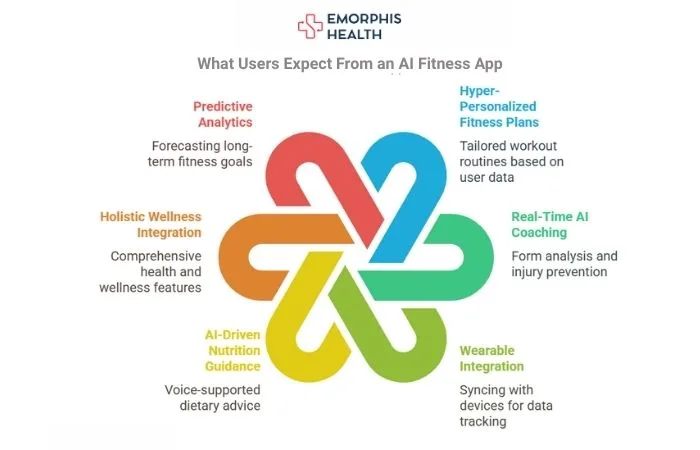
6. Predictive Analytics for Long-Term Goals
As AI fitness apps continue to evolve, users will expect predictive analytics to assess not only their current fitness levels but also to forecast their future progress. These apps will leverage data from wearables, social interactions, and personal goals to provide predictions like:
- Projected goal completion (e.g., “You’ll reach your weight loss goal in 3 weeks if you stay consistent”).
- Potential plateaus or obstacles that may arise, with proactive solutions and advice on how to overcome them.
This predictive capability will enable users to optimize their fitness journey, helping them stay on track toward achieving their long-term goals.
Key Technologies Behind AI-Powered Fitness App Development
Developing a state-of-the-art AI-powered fitness app in 2026 requires leveraging advanced technologies that enhance the user experience, provide real-time insights, and enable scalability. Below are some of the key technologies behind AI-powered fitness app development:
1. Machine Learning (ML) and Deep Learning
At the core of AI fitness apps lies machine learning and deep learning, which allow the app to learn and adapt over time. These technologies enable the app to analyze large amounts of user data and deliver personalized recommendations that evolve as the user progresses.
- Supervised learning can be used to predict user behavior, such as workout preferences or health progress.
- Reinforcement learning can enable the app to improve its recommendations based on user feedback and goal achievements.
With these technologies, fitness apps can adjust workout plans, suggest modifications, and even predict injury risks by analyzing users’ historical data and current trends.
2. Natural Language Processing (NLP) for Voice Interaction
Natural Language Processing (NLP) is increasingly being integrated into fitness apps, enabling users to interact with their app via voice. Whether it’s for asking for workout suggestions, tracking meals, or getting real-time feedback during a workout, NLP allows a hands-free, seamless user experience. In 2026, we can expect to see more sophisticated voice assistants capable of interpreting complex queries, offering motivational cues, and providing in-depth fitness advice, all through natural conversation.
3. Computer Vision for Exercise Tracking and Form Correction
AI apps will leverage computer vision to analyze users’ movements and assess their workout form. By 2026, the ability to correct posture and suggest real-time adjustments through video recognition will be a crucial feature. This can be implemented through the camera of a smartphone or connected wearable devices (e.g., smart glasses or watches) to monitor form, detect errors, and provide immediate corrections.
- Pose estimation algorithms can track user body movements and ensure they are performing exercises correctly, minimizing injury risk.
- Gesture recognition can be used to detect specific movements in workouts such as squats or lunges.
4. Big Data Analytics and Predictive Analytics
Fitness apps will rely heavily on big data analytics to process vast amounts of health and performance data. This data will be used not only to improve AI recommendations but also to provide predictive insights about future trends and potential outcomes. For example, using historical data, the app can forecast when a user might plateau or suggest changes before progress slows down.
The integration of predictive analytics will empower users to stay ahead of the curve by offering proactive adjustments to their workouts, nutrition, or overall health.
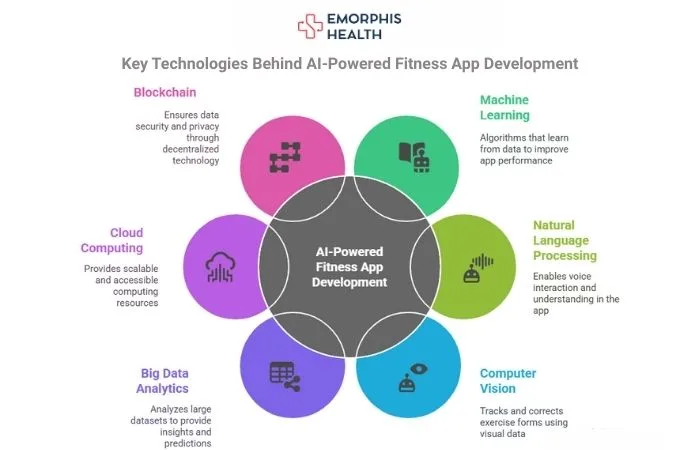
5. Cloud Computing and Edge Computing
Cloud computing enables the storage and real-time processing of large datasets, while edge computing ensures that data processing happens closer to the user, enhancing the speed and efficiency of the app. By 2026, fitness apps will leverage both technologies to provide real-time data insights without latency, making the experience much smoother for users.
These technologies will also allow for better integration with wearables, as data from various devices can be processed and analyzed instantly in the cloud, providing immediate feedback and recommendations.
6. Blockchain for Data Security and Privacy
With the increased focus on data privacy, especially concerning personal health data, blockchain technology will play a significant role in ensuring data security in AI fitness apps. Blockchain allows for secure, transparent transactions and can be used to store fitness and health data in an immutable and encrypted form. This will help fitness apps comply with regulations like GDPR and HIPAA while ensuring that users’ data remains private and protected.
Check our Healthcare App Development Services.
Development Process for an AI Fitness App
Building an AI-powered fitness app involves several structured phases:
1. Strategy and Market Validation
Start by defining your niche: general fitness, weight loss, strength training, women’s health, rehabilitation, etc. Research competitors and identify gaps in existing offerings.
2. Feature Planning and Technical Architecture
Outline essential features based on your target users. Design the AI architecture, determine which models to train, what data you’ll need, and how the app will scale over time.
3. Design and User Experience
UI/UX design should be intuitive and motivating. Gamification, visual feedback, and easy navigation are key to retaining users.
4. Core App Development
Use modern frameworks like React Native for cross-platform development. Integrate machine learning models and backend services securely.
5. AI Model Training and Optimization
This phase involves collecting training data (such as movement patterns or user preferences), training the AI models, and running tests to ensure accuracy.
6. Testing, Compliance, and Deployment
Rigorous QA is critical. You’ll also need to ensure compliance with data regulations like HIPAA or GDPR, especially if your app collects sensitive health data.
7. Post-Launch Support and Iteration
AI fitness apps are dynamic. You’ll need to monitor model performance, user engagement, and continuously update the experience based on real-world feedback.
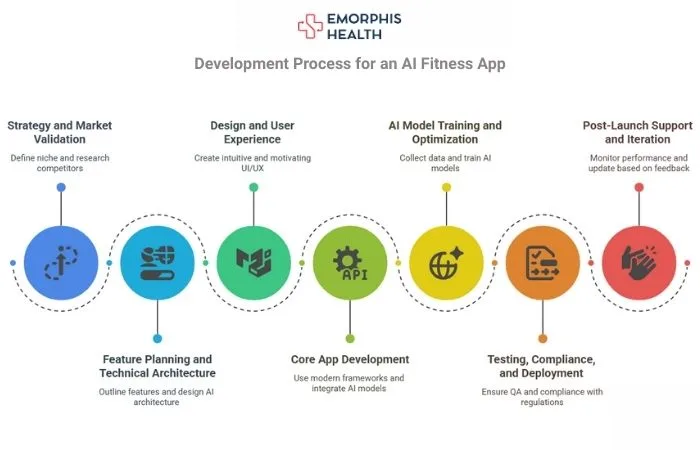
Further, go to the link to find more details on the process for creating a Fitness App.
Estimated Cost to Develop an AI Fitness App
The cost of developing an AI fitness app depends on the scope of features, technical complexity, and location of your development team. Below is a general estimate for a medium-complexity app:
| Component | Estimated Cost |
|---|---|
| Research and Planning | $5,000 – $10,000 |
| UI/UX Design | $7,000 – $15,000 |
| Mobile App Development | $25,000 – $50,000 |
| AI Model Development | $20,000 – $40,000 |
| Backend Infrastructure | $10,000 – $20,000 |
| Testing and Compliance | $5,000 – $10,000 |
| Maintenance and Updates | $2,000 – $5,000/month |
Total Estimated Development Cost: $70,000 – $150,000
These costs can vary significantly based on your specific needs. Partnering with a health tech company experienced in AI fitness app development can streamline your timeline and reduce avoidable costs.
Key Gaps in the Market: How Your Business Can Benefit from AI Fitness App Development
The fitness app market is flooded with options, but when it comes to AI-powered fitness app development, many companies fail to provide the comprehensive solutions businesses truly need. While competitors often tout basic fitness app features, they overlook the critical elements that can take your app to the next level, making it scalable, secure, and highly profitable.
As a business looking to develop an AI-powered fitness app, it’s essential to understand the key gaps in the current market offerings. By targeting these gaps, you can ensure that your app isn’t just another fitness platform but a robust, AI-driven solution that meets the evolving needs of today’s users. Let’s take a closer look at where competitors fall short and how your app development partner can fill these gaps to create a truly transformative AI fitness app.
1. Lack of Detailed AI Architecture and Scalability Insights
The Gap:
When searching for a company to develop your AI fitness app, many providers gloss over the technical aspects of AI architecture. While the concept of AI-driven fitness apps sounds great, developers often fail to dive deep into how the AI will evolve with your user base over time. The absence of a scalable AI architecture can leave your app stagnant, unable to grow or adapt as your business scales.
How We Address This:
For a truly future-proof AI fitness app, it’s crucial that your app’s AI system isn’t just built for today but can also evolve as your business grows. This means integrating a scalable architecture that learns from user data, adapts to new inputs, and continuously improves workout recommendations.
We focus on AI model retraining, user feedback loops, and dynamic feature upgrades that help your app stay relevant and effective in the long term. With our expertise in AI-powered fitness app development, we ensure that your app’s AI system will continually evolve and provide a more personalized experience to users.
Why This Matters:
By choosing a development partner that understands the importance of AI scalability and evolution, you’re ensuring that your app will remain competitive and relevant as your user base grows and user preferences shift. A stagnant app won’t retain users, but one that constantly improves will keep them coming back.
2. Neglecting Health Data Compliance and Security
The Gap:
As a health tech business, you understand that security and privacy are paramount when dealing with personal health data. Unfortunately, many AI fitness app developers fail to prioritize compliance with regulations like HIPAA (Health Insurance Portability and Accountability Act) or GDPR (General Data Protection Regulation).
This oversight can put you at risk of significant penalties, especially if your app handles sensitive user data such as heart rate, sleep patterns, or personal health metrics.
How We Address This:
When developing your AI fitness app, we ensure that compliance is built into the app’s core from day one. We incorporate industry-standard security protocols, including data encryption, secure APIs, and user consent management systems. Our development process also includes regular audits and updates to ensure that your app stays compliant with any changes in health data regulations.
Why This Matters:
Choosing a development team that prioritizes data security and regulatory compliance ensures that your app can safely store and manage sensitive user information without compromising their privacy. This builds trust with your users and protects your business from potential legal complications.
Find out more details on Healthcare Software Regulations And Compliances
3. Lack of Clear Business Use Cases and Monetization Strategies
The Gap:
AI fitness apps offer far more than just workout tracking. However, many companies fail to help clients leverage AI for monetization and scaling. You don’t just want a fitness app that works, you need one that drives revenue and scales seamlessly as your business grows.
Without understanding the full potential of AI-driven monetization, many fitness apps simply offer basic subscription models or one-size-fits-all workouts, missing out on a range of opportunities to generate additional income streams.
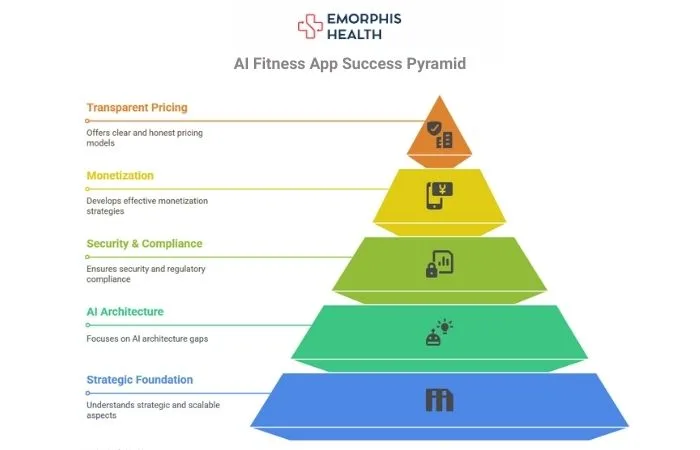
How We Address This:
We work with you to design AI-powered fitness apps that optimize user engagement and monetization strategies. From premium subscriptions for personalized coaching to in-app purchases for advanced features, we help integrate multiple revenue streams. We also design your app with future scaling capabilities, so you can add new features, expand your user base, and integrate with other services (such as wearables or fitness equipment) without overhauling the app.
Why This Matters:
Monetizing a fitness app goes beyond simple subscriptions, it involves providing additional value through personalized services, targeted recommendations, and exclusive content. We help you build an app that generates sustainable revenue while growing with your business.
4. Inadequate Cost Transparency and Clear Pricing Models
The Gap:
When developing an AI fitness app, many companies fail to provide a detailed cost analysis. The cost breakdown for AI model integration, cloud hosting, feature updates, and ongoing support often remains vague or missing altogether. This leaves clients unsure of the total investment needed for both the development and long-term maintenance of their app.
How We Address This:
At every step of the development process, we provide clear and transparent pricing. We offer a comprehensive cost breakdown that includes everything from AI model development and backend infrastructure to long-term maintenance and updates. We also ensure that you understand ongoing costs like cloud storage fees, security measures, and AI model retraining.
By offering clear pricing models and discussing potential additional costs up front, we ensure that you understand the full financial picture, allowing for better budget planning.
Why This Matters:
Having a clear understanding of costs enables you to make informed decisions about your investment. With transparent pricing, you can plan for the future, knowing exactly how much the development, launch, and maintenance of your AI fitness app will cost. This removes any financial surprises down the line, helping you allocate resources effectively.
Closing the Gaps: How Your AI Fitness App Development Partner Can Help You Succeed
In today’s competitive market, simply offering an AI fitness app with basic features is not enough. You need a development partner who understands the strategic, scalable, and compliant aspects of AI fitness apps. By focusing on the gaps left by other developers, such as AI architecture, security, monetization, and transparent pricing, you ensure that your app is ready for the future, able to grow alongside your business, and built with the user’s trust in mind.
Choosing the right partner for AI-powered fitness app development means investing in a solution that not only meets today’s needs but also anticipates tomorrow’s challenges. By filling these gaps, you’ll be able to create a highly competitive, scalable, and profitable AI fitness app that stands out in a crowded marketplace.
Are you ready to take your fitness app to the next level? Contact us today to discuss how we can build an AI-powered fitness app that delivers value, engages users, and drives revenue for your business.

